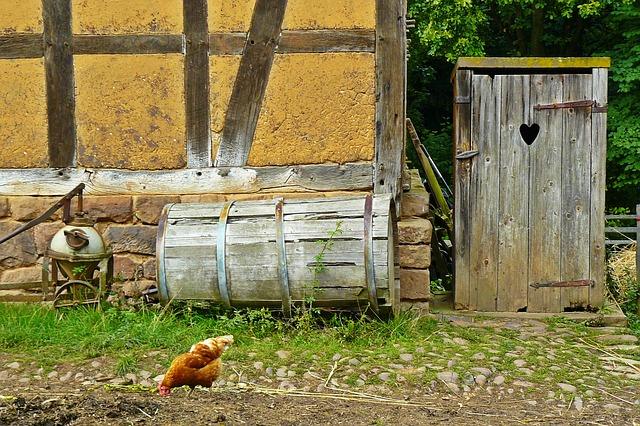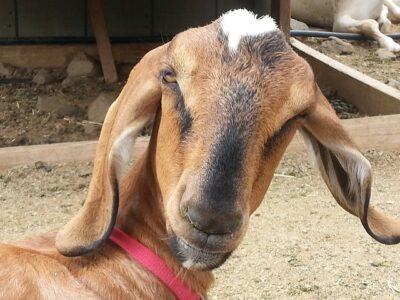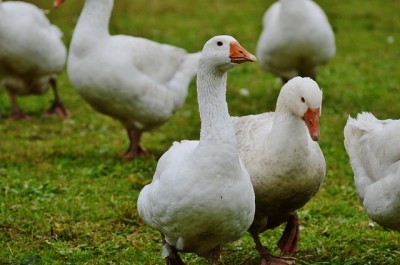Every organism needs to eat. It is a fact of life. Another fact is that a hungry creature is going to expend the least possible amount of energy it takes in order to reap the greatest possible reward.
For example, you would not walk a mile to get a banana if you could get a similar one by walking into the next room. Nor would you buy food for which you had to work three hours to earn the money for it, in lieu of buying comparable food for which you had to work only a half hour.
Animals operate similarly. If they can get your chickens more easily than they can catch a wild bird, they will. Like us, they weigh the costs and benefits. We compare cheap food with unsavory side effects to that which is higher cost and higher value. A wild predator, too, will have to take into account that scoring a chicken or lamb comes at the cost of ranging dangerously close to humans.
Do not hate wildlife. They are not evil beings for menacing your livestock. It’s nothing personal. They just want to eat the best food they can, at the lowest cost to themselves.
It is the job of the farmer and homesteader to make the potential cost of eating domestic animals so high that wild predators move along and choose a different option.
Diatomaceous Earth: The All-Natural De-Wormer For Your Livestock [2]
At my place, we have an implicit agreement. My animals provide me with eggs, milk, brush clearing, poison ivy control, meat, and hides. In return, I give food, shelter, health care, decent living conditions, and as much protection as I can.
There are some things you can do to keep your domestic animals off the raw local foods menu.
1. Control your livestock’s whereabouts. This seems simple and obvious, and it usually is. Keeping your animals surrounded by fence, inside a barn, and near to the house is your first line of defense. The ability and need to do this varies among species, across geography, and even day to day. Beef cattle might live out on the range with less protection than week-old turkey poults, but they are less vulnerable. Small ruminants are often safe out grazing during the day but are better off being locked up in the barn at night.
2. Control predator access. We use a high-voltage charger on our electric mesh fencing and have been asked by visitors if that much punch is really necessary to keep goats in. The answer is no, but the fence’s primary purpose is not to keep goats in. It is to keep predators out.
Portable electric fence won’t keep out all predators and won’t operate year-round in some climates. Physical barriers can also be effective. Fence openings need to be small enough to keep out whatever species of predators are the greatest threat. I have heard of cases where a weasel repeatedly got into the chickens, and the owners kept replacing the enclosure until they got down to one inch mesh before they were able to stop the attacks.
Concerns of predators digging under fences can be allayed by burying the fence below the surface.
3. Use a deterrent. There are countless methods on the market, from electronic motion-sensor gadgets that emit light and sound to animal urine to deterrent powders. There are old-fashioned decoys available, such as lifelike owl statues to scare off birds. Some people advocate old-timey remedies such as scattering human hair or urine around the perimeter. As for the effectiveness of these methods, there are probably as many opinions as there are types of deterrents. If you see something that makes sense to you, try it. It might work for you but not for someone else, or vice versa.
4. Be present. The more time you spend out in the barnyard and beyond, the more it screams “Humans Live Here!” to hungry hunters scouting the area. Walk around the outer reaches of your property as much as you can, leaving the scent from the bottom of your shoes that will be off-putting to predators. I make sure my dog and I crisscross the area between the habitats of domestic and wild animals every day, just to let them know we’re still around.
5. Bring in some hired bodyguards. I don’t mean the kind of people who surround the president’s motorcade. I mean the kind of no-nonsense animals for whom barnyard security is a way of life. Livestock guardian dogs are often the go-to. They are usually big strong breeds with a streak of independence and the ability to make their own decisions. The need to protect their flocks and herds is in their genes, and some of them even sleep during the day and patrol the perimeter at night.
If a dog is not right for your budget or training skills, consider a guard llama or donkey. These animals are often used to keep goats and sheep safe from predation, and are known not only for engaging in physical combat when necessary but also for making some serious noise when a threat is afoot.
Sometimes an alarm call is sufficient. The loud bray of a donkey or screech of a guinea fowl warns everyone within earshot whether they speak the same language or not. When my dogs bark at something out front of the house, the goats browsing way out back drop everything and stampede to the barn. It’s a universal call of danger, and everyone gets it.
Barnyard animals will often seek the protection of one another on their own. My chickens follow the goats, not only to pick over anything left behind, but for safety in numbers.
6. When all else fails, do what you have to do. If it is legal to shoot a persistent barnyard stalker where you live and you have the ability to do so, sometimes that is the only answer. We had a fox after the chickens one summer, growing increasingly bold until it was slinking into the chicken pen in daylight hours while people were in the garden less than 50 yards away. We knew it was him or the chickens, and my husband lay in wait one morning and got him.
Discover 1,147 Secrets Of Successful Off-Grid Living! [5]
Remember to make sure it is legal. Many states make exceptions to licensing and season laws for farmers, but not all do. And most laws regarding birds of prey are very strict. A bald eagle came after my chickens last summer, and the best we could do was keep them indoors for a few days until the eagle got bored and moved on. It is never legal under any circumstances to kill or injure an eagle, and laws regarding many other birds of prey are prohibitive as well.
Some people prefer trapping. I personally do not believe in it. Leg hold traps are dangerous to domestic animals and can cause the perpetrator to suffer unduly. Have-a-Heart traps do no physical harm to the animal, and can result in relocating a creature. I will not deny that traps are the best option for certain situations, so use your own judgement.
Extra vigilance is required in some seasons. Predation threats to livestock naturally increase when wild food is more scarce or harder to access. Winter conditions can cause hunters to become desperate, and can cause barnyard animals to become more easily attainable. Snowpack makes scaling fences easier and muffles sound.
Spring births place livestock more at risk, as well, for all the reasons one might expect — the birth event, possible weakness and distraction of the mother, and the irresistibility of the newborn tasty morsel.
If your predator threat is significant, you may well not be successful using just one method of predation protection. Livestock guardian dogs are extremely effective but not foolproof, and most of the other methods are imperfect. A combination of two or more methods is wise, especially if you change them up occasionally and ramp them up in periods of higher threats.
At the end of the day, while you cannot blame a hungry coyote or bobcat for wanting an easy meal, you will still be responsible for the safety of your livestock. Use these ideas and due diligence to stay one step ahead of predators and keep your animals from becoming victims of predation.
Related:
The 6 Easiest Ways To Protect Your Chickens From Predators [6]
What advice would you add on keeping predators away? Share your tips in the section below:



